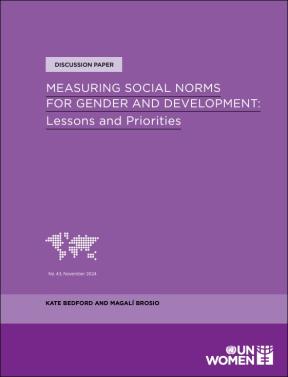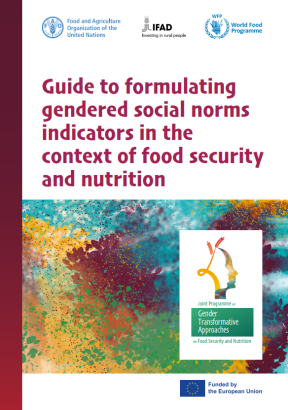
- Blog
- 28 Octubre 2020
Using the Social Norms Analysis Framework (SNAP) to explore the influence of social norms on women’s economic participation in Vietnam
- Author: My Linh Nguyen
The brakes on women’s economic empowerment in Vietnam, and the accelerators that can support that empowerment, are explored in a new study by CARE International. The study draws on social norms theory to test the strength of three norms related to recruitment and promotion:
- women should be primarily responsible for child and family caretaking (caregiving norm)
- women should not be in leadership positions within the workplace (leadership norm), and
- only men should be hired for technical jobs (personal belief).
The research reveals a mix of ‘sticky’ norms that may be hard to shift and more fluid beliefs that are, therefore, more susceptible to change.
Background
In late 2019, Investing in Women (IW), an initiative of the Australian Government, commissioned CARE International in Vietnam to conduct a qualitative study. The aim: to examine the role of social norms as brakes or accelerators to women’s economic empowerment and inform IW-supported programming on gendered social norms and workplace gender equality.
The study used CARE’s Social Norms Analysis Framework (SNAP), which is based on Biccheri’s social norms theory, to examine gendered social norms related to recruitment and promotion. The SNAP framework guided the design and analysis of 16 qualitative vignettes that were used in focus group discussions (FGDs) and in-depth interviews (IDIs) to draw out views on five key components of norms:
- what other people do
- what other people expect us to do
- sanctions
- sensitivity to sanctions, and
- exceptions.
The SNAP framework succeeded in exploring the strength and influence of certain norms for specific behaviours, and whether and when norms shift and weaken.
Norm verification: when a norm is actually a belief
The literature identified three potential norms linked to women that impacted economic participation. As a result of data collection and analysis using SNAP, the research confirmed the presence of a ‘caregiving norm’ (women’s responsibility for taking care of the children and family) and a ‘leadership norm’ (women should not be leadership positions in the workplace).
The SNAP framework revealed that the third norm identified in the literature – ‘only men should be hired for technical jobs’ – was actually a belief, rather than a deeply embedded norm. According to Biccheri’s concept of social norms, expectations of typical and appropriate behaviours signal the presence of a social norm. However, our data suggest that while there was a significant preference for hiring men for technical jobs, there was little evidence that this action was considered to be typical and appropriate behaviour.
Importantly, there was a lack of expected sanctions for anyone who hired a woman for a technical job, or for a woman who sought such a job. A small number of reference group members in the IT sector said that women should comply with the caregiving norm. They expressed concern about women’s physical strength, as some technical tasks mean lifting heavy equipment, while others felt that working at night or on weekends (e.g. in the electricity and IT sector) might be challenging for women. We concluded, therefore, that ‘only men should be hired for technical jobs’ is not actually a norm, but rather a strongly held belief that men are more suitable for technical jobs than women.


Norm strength
The unique characteristics and strength of SNAP in informing social norm change interventions provide a way to assess whether a norm influences behaviour, in particular through ‘sensitivity to sanctions’. By using this framework, our research has produced valuable findings about opportunities for norm change, including findings on how the influence of a social norm weakens across sectors, age groups, marital and children status.
Despite anticipated sanctions for not complying with the caregiving norm, women in their late twenties believed that sanctions should be ignored and that women should follow their careers. There may be more opportunities to consolidate norm change among women in this age group by, for example, bridging connections among like-minded women in similar situations for peer support and to give them with a broader reference group that is more supportive of change.
For the leadership norm, the study found that there are more opportunities to facilitate norm change for young female millennials who are under 25 years and in their early thirties; for single women; for women with no children; and for women working in the garment sector. These women believed very strongly that women should ignore sanctions from their reference groups (mostly their husbands and partners) and pursue leadership opportunities.
The SNAP methodology – lessons for future research
This study is the first time SNAP has been adapted and used to research women’s economic participation in South East Asia, and a number of lessons have emerged. While vignettes are useful in eliciting insightful data from research participants, they must be very focussed if they are to be effective. In other words, each vignette can only explore one norm at a time. Our research was ambitious in trying to examine two norms and one personal belief across two contexts: recruitment and promotion and five sectors. This meant that we had to create a large set of vignettes and explore at least one or two vignettes in each FGD. This could be tiring for the research participants, as the FGDs take longer. Equally, researchers feel a time pressure that could result in them rushing the focus group to elicit responses.
We do not, therefore, recommend trying to achieve ‘breadth’ and ‘depth’ by using vignettes alone to explore social norms. Further, we find that vignettes work better when used in FGDs rather than IDIs. IDIs seem to gather more information about individual beliefs and attitudes, which helps to inform interventions for behaviour change rather than providing information about perceptions for each component of the SNAP framework.
The research proves, however, that the SNAP framework can be adapted to different thematic areas, given that social norms are prevalent across all aspects of society. The framework has helped us to explore and confirm social norms by systematically identifying and testing the different components that make up a norm and the links between them.
For more information, see the full study report: Investing gendered social norms affecting women’s economic participation related to recruitment and promotion in Vietnam
About the author


My Linh Nguyen is the Senior Advisor, GESI and Economic Justice, CARE Australia. She co-led the research Investing gendered social norms affecting women’s economic participation related to recruitment and promotion in Vietnam. My Linh has over 15 years of experience working for development agencies in Australia and Asia. Her main areas of technical expertise include gender equality, women economic empowerment, sexual and reproductive health and rights. View My Linh's LinkedIn profile or contact her by email with any questions regarding this research.
- Countries / Regions:
- Viet Nam
Related resources
Briefing paper
1 Noviembre 2024

Report
21 Julio 2022

Blog
7 Enero 2022


Content is loading...